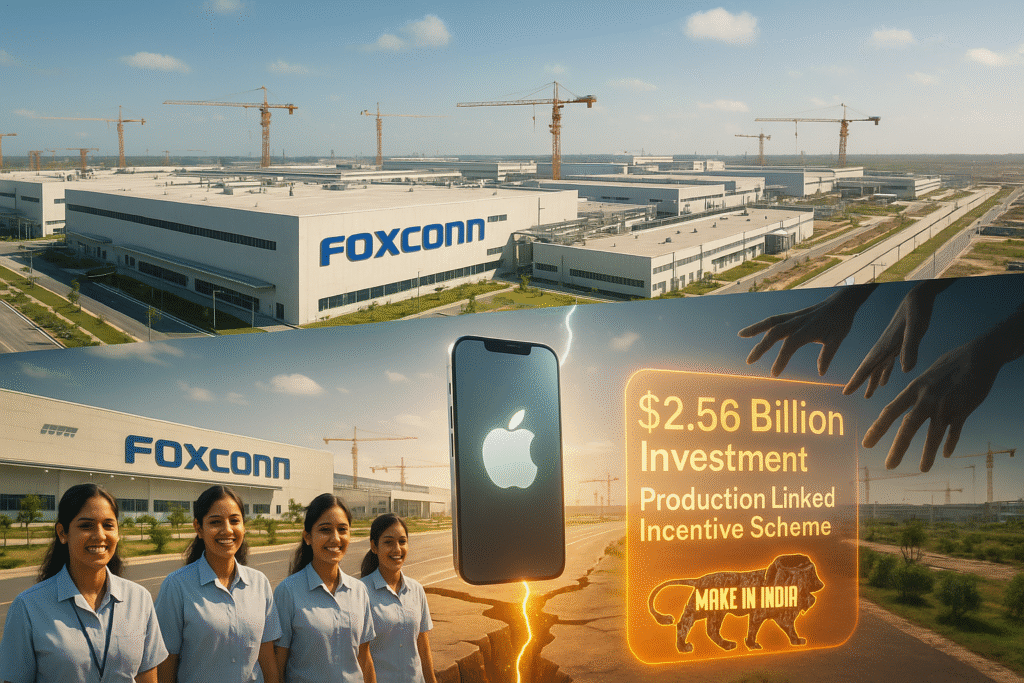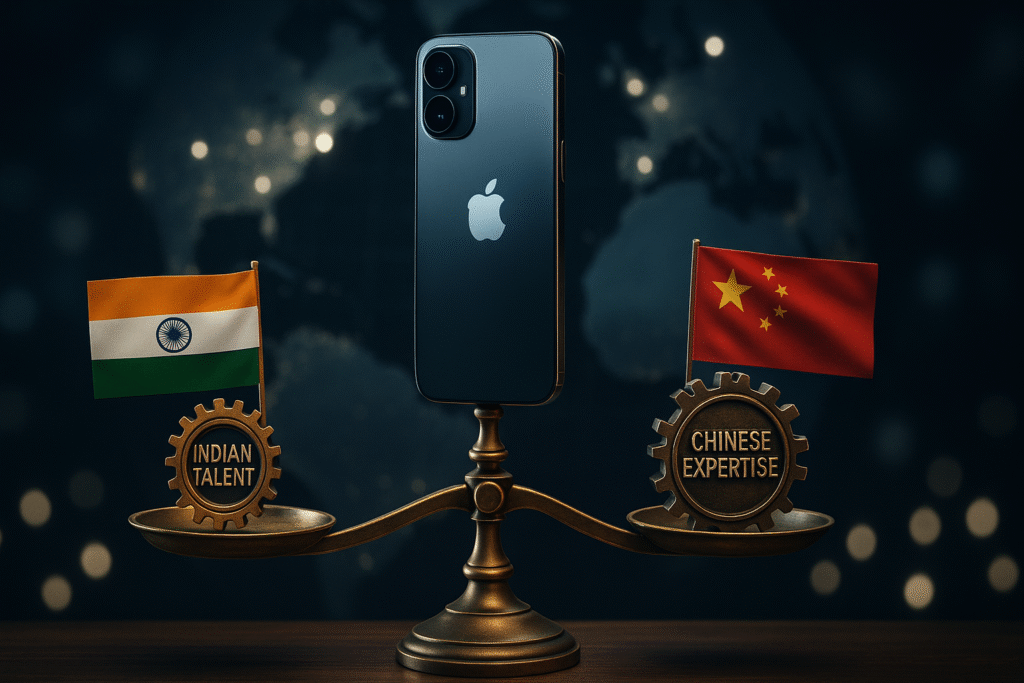The Apple India vs China rivalry has reached a critical flashpoint, sending shockwaves through the world of global manufacturing. At its epicentre lies Apple’s audacious bet on India. For years, we’ve watched the Cupertino behemoth strategically pivot its mammoth supply chain away from its long-standing China base. India, with its vast potential and government backing, has been the undisputed star of this new script. The narrative has been one of relentless growth, staggering investments, and a win-win for both Apple and the ‘Make in India’ initiative.
However, a recent, quiet development has introduced a dramatic new chapter. The recall of hundreds of key Chinese engineers from Foxconn’s Indian facilities has ignited a fierce debate: Is this a mere operational shuffle, or is it a calculated geopolitical power play designed to slam the brakes on Apple’s Indian odyssey?
The Billion-Dollar Bet on India

Let’s first set the stage. Apple’s diversification from China wasn’t a whim; it was a strategic imperative. A perfect storm of escalating US-China trade friction, stark supply chain vulnerabilities revealed during the pandemic, and a need to de-risk from geopolitical headwinds (the process of reducing reliance on a single country or region to avoid being impacted by its political or economic instability) forced a rethink of the “efficiency at all costs” model.
- Why India? A Perfect Match: India rolled out the red carpet with its Production Linked Incentive (PLI) scheme (a form of government subsidy where companies receive financial rewards for increasing their domestic manufacturing and sales. Learn more about the PLI Scheme here). Foxconn, Apple’s primary partner, has been a major beneficiary. This, coupled with India’s burgeoning manufacturing ecosystem and its strategic location, made it the logical next frontier.
- Putting Money Where the Mouth Is: The commitment has been anything but tentative. Foxconn is pouring a colossal $2.56 billion into its sprawling 300-acre Devanahalli plant near Bengaluru. This isn’t just an assembly plant; it’s a mini-city, complete with dormitories to house tens of thousands of its predominantly female workforce.
- The Numbers Don’t Lie: The results have been nothing short of spectacular. In a remarkably short span, India has scaled up to account for an estimated 20% of global iPhone production. The export figures are even more telling. Between March and May of this year, a staggering $3.2 billion worth of iPhones were exported from India, with an astonishing 97% of these devices heading directly to the United States. This strategic rerouting allows Apple to deftly sidestep the steep US tariffs on Chinese-made goods, cementing India’s role as the primary manufacturing hub for the American market. This rise is not happening in isolation; it mirrors the growing global ambitions of India’s own corporate giants.
A Sudden Exodus and a Cloud of Doubt

Just as the India growth story seemed unassailable, the script took an unexpected turn, escalating the Apple India vs China dynamic. Over the past two months, Foxconn has quietly recalled more than 300 of its Chinese engineers and technicians from its Indian iPhone plants.
- The Expertise Vacuum: These are not just any employees. They are the specialists in setting up complex production lines and overseeing the intricate technical processes required for a device as sophisticated as an iPhone. Their sudden departure creates a potential “talent vacuum” precisely when Apple is gearing up for the critical ramp-up of its next-generation iPhone 17. While the quality of the final product may not be immediately compromised, assembly line efficiency could take a significant hit.
- Beijing’s Invisible Hand? The timing and nature of this recall have led to strong speculation that this is not an isolated corporate decision. Reports suggest that officials in Beijing have been verbally encouraging a curb on technology and talent transfers to manufacturing rivals like India. This move is being widely interpreted as a form of “subtle, strategic sabotage”—a calculated maneuver to slow down the de-risking of global supply chains, a battle we’re also seeing in the hidde conflict over China’s EV magnet monopoly. It’s a stark reminder of a point Apple’s CEO, Tim Cook, has often made about the “irreplaceable expertise” of the Chinese workforce. This is a clear move in the ongoing Apple India vs China chess match.
“Negligible Impact” or Wishful Thinking?

While the headlines paint a grim picture, some of the most seasoned industry watchers are urging caution. Prominent Apple analyst Ming-Chi Kuo (a highly respected analyst at TF International Securities known for his accurate predictions about Apple’s product pipeline and supply chain moves. Follow his analysis here) has publicly stated that the impact of this personnel shift will be “negligible.”
- The Taiwanese Foundation: Kuo’s crucial point is that the foundational production capabilities at Foxconn’s India facilities were established by its Taiwanese employees, not the Chinese mainland staff. The number of Chinese engineers, while significant, was reportedly not as mission-critical as initially feared.
- A Planned Transition: Furthermore, Kuo suggests that this was not a sudden, hostile withdrawal. The gradual return of Chinese employees was apparently in the works for some time, and Apple was fully aware of the plan. This paints a picture of a managed, phased transition rather than an abrupt crisis.
- Follow the Money: Perhaps the most compelling counter-argument is Foxconn’s continued investment. The company has shown no signs of slowing its expansion, with massive capital infusions still flowing into its Indian subsidiary. Actions, in this case, may speak louder than the absence of a few hundred engineers.
The iPhone 17 Litmus Test

So, where does the Apple India vs China saga leave Apple’s great Indian adventure? The truth likely lies somewhere between a strategic catastrophe and a minor hiccup. We are witnessing a high-stakes balancing act where corporate strategy, national ambition, and global geopolitics are colliding in real-time.
The path forward will be the ultimate litmus test. The upcoming production cycle for the iPhone 17 will reveal the true impact of this talent exodus. Will India’s burgeoning ecosystem and its Taiwanese technical leadership prove resilient enough to handle the ramp-up seamlessly? Or will the absence of seasoned Chinese expertise lead to the very delays and inefficiencies that Beijing may have hoped for?
Apple’s journey in India is more than a business story; it is a defining case study in the Apple India vs China era and the future of global manufacturing. It demonstrates that while the will to diversify is strong, the process will be actively resisted by incumbent powers. The long-term success of the ‘Make in India’ dream, a theme we’ve explored even in the transformation of Bengal’s defence manufacture sector, will hinge not just on building factories, but on rapidly cultivating a deep well of homegrown talent capable of steering the ship independently. The world is watching.
Disclaimer: This blog post is for informational purposes only and represents an analysis of current events. It should not be construed as financial advice or a recommendation to buy or sell any securities. Always conduct your own thorough research and consult with a qualified financial advisor before making any investment decisions.
